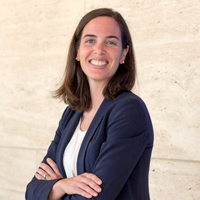Sarah Middleton loves her job as the head of the PIMCO Foundation, the philanthropic arm of investment management firm PIMCO. She shares what makes her job great and what makes her great at her job.

A: After college, I joined AmeriCorps and moved to Orange County, CA for my placement. My one year as an AmeriCorps volunteer completely changed my life (I know, it’s cliché!). I spent six years in the nonprofit sector and learned a ton. Through my development work, I interacted frequently with regional corporate responsibility leaders and I was quite taken by the work being done by the nonprofit arms of these local companies. So when I heard about an opening at PIMCO, I jumped at the opportunity. I joined the firm in 2007 to build the employee volunteer program and in 2012 became executive director of the PIMCO Foundation. In this role, I oversee the firm’s global philanthropy and volunteerism efforts.
I have my dream job. I get to be creative and innovative; I get to build something every day; I get to meet remarkable changemakers the world over; I get to provide transformative volunteer and give-back opportunities to my PIMCO colleagues; and I have the chance to continuously learn.
Sometimes, when I just need to think or see differently, I get in my car, drive to a nearby nonprofit, and I get out and volunteer. Service will give me a different perspective—fast.
A: Thank you for the kind words. We measure the success of our initiatives through a few different avenues. For certain programs, we may use predetermined outcomes. For others, we use drivers of outcomes. And for still others, we use open-ended feedback.
On the philanthropy side, we seek a written record of grant-related activities, accomplishments, and challenges that the grantee faced during the reporting period. We seek information on general progress, course corrections, risks and concerns, sustainability, scalability, and lessons learned. We also ask for a client story. We want to understand how our grantmaking can increase an organization’s capacity.
On the volunteerism side, we ask our nonprofit partners to share with us the output of our volunteers’ service and proof of progress toward the organization’s mission and goals. Our overarching goal is to determine how our volunteers increased the efficiency, resources, capacity, awareness of key issues, and brand recognition of our nonprofit partners.
We also survey our employees to capture their expanded cultural competence, strengthened understanding of teamwork and leadership skills, and expanded understanding of resilience and adaptability.
A: Last year, we embarked on a large-scale research project to take a look at our corporate responsibility framework and determine what we could be doing differently. As part of this project, we conducted employee focus groups in our offices around the world and we also interviewed members of senior management. The feedback that was returned to us was incredibly thought-provoking. As a result, we adopted a focused strategy based on themes that our employees highlighted during these conversations—hunger and gender equality.
A: This work can definitely be challenging at times. But I think all social change work can be—and it should be! I have to keep my eye on the big prize, which is this huge, awesome, amazing impact we want to make on global hunger and gender inequalities. I can’t let myself get impatient. Sometimes, when I just need to think or see differently, I get in my car, drive to a nearby nonprofit, and I get out and volunteer. Service will give me a different perspective—fast.
A: Just one piece?! Okay, if I had one piece of advice to offer, it would be this: Talk to individuals in corporate responsibility now. Do your research, read the white papers, and understand the business case. Know how corporate responsibility efforts both build brands and create social impact.
Featured Photo: Raise Youth Voice With New Leadership Council by Global Fund For Children
Find exactly what you're looking for in our Learn Library by searching for specific words or phrases related to the content you need.